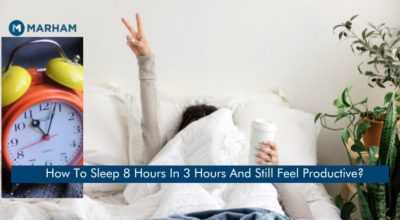While setting our daily alarm, a question always pops up at the back of our mind, and we wonder how to sleep 8 hours in 3 hours. The question may sound absurd to many as it may seem practically impossible, but this issue can be solved simply by improving the quality of your sleep.
Highlights
- You can sleep less but feel productive and energized throughout the day by improving the quality of sleep.
- Reduce screen time and caffeine intake before bed, and eat a healthy diet to improve your sleep quality.
How Much Sleep is Necessary for a Healthy Body?
The amount of sleep a healthy body needs depends on many factors, including the age.
For different age groups, the amount of sleep required is given in the table below:
| Age group | Recommended Amount of Sleep |
|---|---|
| Infants 4 months to 12 months | 12 to 16 hours per 24 hours (including naps) |
| 1 to 2 years | 11 to 14 hours per 24 hours (including naps) |
| 3 to 5 years | 10 to 13 hours per 24 hours (including naps) |
| 6 to 12 years | 9 to 12 hours per 24 hours |
| 13 to 18 years | 8 to 10 hours per 24 hours |
| Adults | 7 or more hours a night |
Additionally, there are some other factors that can also affect how many hours of sleep a healthy body needs, including:
- Sleep Quality
- Previous Sleep Deprivation
- Aging
- Pregnancy
For children, getting the right amount of sleep regularly leads to better health, improved learning, attention, behavior, memory, quality of life, ability to control emotions, and physical and mental health.
Read More: How To Maintain A Healthy Sleep Schedule?
In the case of adults, getting less than 7 hours of sleep a night regularly leads to poor health, diabetes, heart disease, weight gain, having a BMI of 30 or higher, high blood pressure, depression, stroke, etc.
Sleeping more than 9 hours is not harmful but can also help young adults who are recovering from sleeping deprivation or are sick.
Do You Know? Many people around the world struggle with sleep anxiety which results in sleepless days and can cause health issues. However, you can meditate, make lifestyle changes, or consult a doctor to calm your anxiety at night.
Can You Really Get 8 Hours of Sleep in 3 Hours?
If you have searched for, “how to sleep 8 hours in 3 hours”, then it is a bold question.
The doctors usually recommend getting 7-8 hours of sleep every night.
Well, we all know that 3 hours of sleep is a far cry from the recommended amount of sleep to maintain energy and physical and mental health.
However, under some circumstances, we are unable to sleep and this interferes with our sleep schedules. Some people really get only 3 hours of sleep every night.
Read More: How To Sleep 8 Hours In 4 Hours- Is it healthy?


How to Sleep 8 Hours in 3 Hours?
You might sometimes feel that there are just 24 hours in a day and a lot on your to-do list. House chores, work, lunch, family and friends gatherings, and some me-time leave no space to sleep. So, you may want to spend the minimum of your time sleeping while achieving maximum productivity.
The solution to this problem is that by increasing the quality of your sleep, you can get the maximum benefit out of these 3 hours of sleep.
Read More: 5 Simple Lifestyle Changes For Better Sleep
1. Reduce Screen Time Before Bed
Well! You don’t have time to sleep so you are browsing how to sleep 8 hours in 3 hours, stop doing it as the screen will damage your plan to sleep.
- The blue light on the screen reduces your ability to sleep so avoid using a screen or watching Tv just before going to sleep.
- Blue light reduces the sleep hormone, melatonin production, which is essential to make you feel drowsy.
- Studies also show that blue light messes up your circadian rhythm.
2. Sleep in a Dark Room
The relationship between sleep and light has been studied extensively. If you want to know how to sleep 8 hours in 3 hours, the key is to make your room dark.
- The circadian rhythm is designed such that it wakes up the body during the day and as it gets dark, the body begins to shut itself down.
- Melatonin is released as your biological clock announces that it’s night and dark.
- It makes you sleepy without tossing and turning for hours in bed.
3. Avoid Caffeine Before Bed-Time
For a sound sleep, restrict your caffeine intake at least 6 hours before bedtime.
- Caffeine is a central nervous system stimulant, and hence, its intake disrupts our circadian clock, which directly affects melatonin production.
- This overall effect reduces deep sleep time, causing you to invest many hours lying hopelessly in bed with your eyes wide open.
- As coffee is a rich source of caffeine, avoid consuming it before bedtime if you want to improve your sleep quality and feel productive even with reduced sleep hours.
Also, Read how to sleep 8 hours in 4 hours.
4. Reduce Stress
If you are stressed over how to sleep 8 hours in 3 hours, then the first step is to stop stressing about it, because stress prolongs the time required to fall asleep.
- Stress also releases the hormone cortisol (Stress hormone), which makes the body alert and in survival mode.
- Hence, the biological clock stops melatonin production, and sleep vanishes from your eyes.
- The data from ADAA shows that stress often leads to insomnia and reduces the quality of your sleep.
5. Exercise Daily
Recent evidence shows that moderate aerobic exercise can improve sleep quality.
- In research, almost 76-83% of participants had improved sleep quality after getting involved in moderate daily exercise.
- Exercise not only increases the blood flow to your brain but also enhances your core body temperature. After about 90-100 mins, it begins to fall back to normal ranges, thus facilitating sleepiness.
- Hence, indulging in aerobic exercise for at least 30 minutes before bedtime aids in improving the quality of sleep.
6. Eat a Healthy Diet
A healthy diet stuffed with all the essential vitamins and nutrients keeps your energy levels high and keeps you active even after sleeping for only 3 hours.
- A diet rich in carbohydrates, tryptophan, and melatonin (eggs and fish) imparts a positive effect on the quality of sleep.
- Excess sugar is bad for your sleep quality. So, try to avoid consuming high amounts of sugar.
- Research also proved that low-protein intake was associated with poor quality as well as prolonged initiation of sleep.
- Taking warm milk soothes the body and mind, and hence, it is recommended to take it before bedtime to improve your sleep quality.
Thus, a well-balanced and healthy diet aids in improving sleep quality, making those 3 hours of sleep more beneficial to your body than 8 long hours of poor sleep.
7. Early to Bed and Early to Rise
Sleep quality is directly linked with the time you go to sleep which further depends on your performance during the upcoming day.
- The same was reported in a study that showed that when sleep timing was correlated with academic performance in college students, the performance declined with late sleep.
- The natural circadian rhythm starts releasing the melatonin as soon as it gets dark, reaches the peak between 2-4 am, and falls in the last half of the night.
- The peak melatonin time is the high time for you to go to bed and enjoy some quality sleep in just 3 hours.
8. Take naps during the day
If you are a night owl and get only 2-3 hours of sleep at night, then the golden tip is to take small naps during the day.
- Resting your mind and eyes for a small productive nap and practicing it multiple times during the day can make you feel fresh and full of energy at night.
- Close your eyes for 10-15 minutes during the day and relax your mind. This keeps you fresh and going throughout the day.
9. Drink chamomile tea
You can drink chamomile tea before bedtime to get 3 hours of sleep in 8 hours.
Chamomile tea has a soothing effect which makes it a perfect drink for bedtime.
Read More: Sleep: Why Should You Aim For A Proper Sleep?
What is Normal Sleep Time?
Sleep is one of the body’s basic needs to restore energy and function optimally. It repairs cell damage and powers the brain. The National Sleep Foundation recommends that 7-9 hours of sleep is essential for an adult.
Sleep has four stages. Out of these, three stages are of Non-Rapid Eye Movement (NREM) and the last of Rapid Eye Movement (REM). These stages last for 90 minutes and repeat about 6-7 times during sleep.
Read More: 6 Effective Strategies to Improve your Sleep
You can also watch this video by Dr. Asim Allah Bakhsh in which he talks about the best tips for sleeping and the importance of sleep hygiene.
Effects of Sleep Deprivation on Your Body
Continuously taking a night of sleep for less than the recommended hours can affect health in multiple ways, like;
- Sleep deprivation affects your memory
- Endocrine functions are compromised and hormonal imbalance may occur
- Metabolism may slow down owing to the persistent lack of sleep
- Increases risk of hypertension
- Increases risk of obesity
- Increases chances of heart attack and stroke
- May lead to anxiety and depression
Final Words
You can sleep less and still feel productive with a couple of lifestyle modifications and changes in your sleeping pattern. However, it doesn’t impart the same health benefits as sleeping for the standard recommended number of hours. Several health risk factors are associated with a lack of sleep. Hence, it is suggested to not disrupt the ideal sleep-wake cycle by challenging your body and getting the recommended hours of sleep each night.
Consult a doctor for any sleep-related problems including insomnia or somnolence.
Frequently Asked Questions (FAQs)
1. How do you function after 3 hours of sleep?
If you just have 3 hours to sleep then munch on protein-rich foods like nuts that boost your energy and avoid taking heavy meals rich in carbohydrates. Drink caffeine and exercise to stay fresh.
2. How do you fall asleep quickly?
Set your schedule if you want to initiate your sleep quickly. Avoid using screens before bedtime. Also, avoid caffeine and naps during the day.
3. How much sleep do you need?
The recommended sleep hours may vary according to your age. However, for an adult, the average recommended sleep is 7-8 hours.

